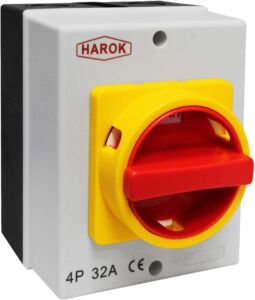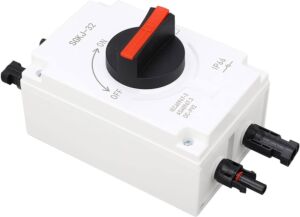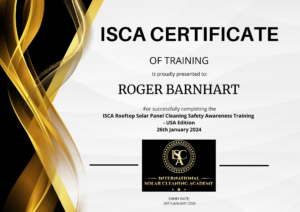
Can Solar Panels Be Turned Off?
The subject of whether solar panels can be turned off is a growing topic in the minds of solar panel cleaners. New solar panel cleaners think they can turn solar panels off by turning the big switches near the inverters and if they do this, it will eliminate any electrocution risk and make their work safer. Is this the case? Are you wondering whether solar panels can be simply switched off like traditional electrical appliances? Should they be turned off? In this comprehensive guide, we’ll delve into the intricacies of solar panel operation and maintenance, examine safety risks for cleaners, address common misconceptions, highlight the potential risks associated with attempting to turn off solar panels and provide essential safety guidelines.
Understanding Solar Panel Operation:
Unlike traditional appliances that operate on AC electricity, solar panels create DC electricity and operate continuously in response to light. This means that as long as there is daylight, solar panels will generate electricity.
Grid Integration and Challenges:
Solar panel systems are typically integrated into the electrical grid, necessitating complex circuitry and inverters for seamless distribution of electricity. Attempting to turn off solar panels within a grid-connected system can disrupt the balance of electricity supply and demand, potentially causing instability and operational issues. Moreover, solar energy production depends on sunlight availability, complicating control efforts even if isolator switches are installed.
Inability to Control Solar Energy Production:
The intermittent nature of solar energy production further complicates the concept of turning off solar panels. Unlike fossil fuel-based power plants, solar energy output is contingent upon weather conditions and time of day, making precise control challenging even if on/off switches were installed.
Safety Risks for Solar Panel Cleaners:
While isolating solar panels from the grid may seem like a solution to turning them off, several factors contribute to ongoing safety risks for maintenance personnel, particularly concerning electrocution hazards.
- Voltage: During daylight hours, solar panels will contain considerable voltage from sunlight exposure. This ever-fluctuating voltage poses a significant risk of electric shock to cleaners if proper precautions are not taken.
- Junction Boxes, Micro-inverters and Optimizers: Many modern solar panel installations incorporate micro-inverters or power optimizers for enhanced energy efficiency and performance monitoring. These devices maintain electrical connections even when panels are isolated from the grid, potentially exposing cleaners to live electrical components.
- Poor Installation Methods: Not all solar arrays are installed to a high standard. Some installations are installed incorrectly, using cheap equipment, substituting DC isolators for AC isolators, incorrect placement of MC4 connectors, insufficient care on DC cable routes all increase electrocution risks for solar panel cleaners.
- Faulty Equipment or Wiring: Equipment malfunctions or wiring faults within solar panel installations can create hazardous conditions for solar panel cleaners. Insulation failures, damaged connectors, or improper grounding may not be immediately apparent, increasing the risk of electrocution during cleaning operations.
- Environmental Factors: External factors such as moisture, debris accumulation, or animal nesting can exacerbate the risk of electrical hazards during solar panel cleaning. Water intrusion or foreign object contact may compromise insulation integrity, heightening the likelihood of electrical contact and subsequent injury.
What Does Turning Off Isolators On Solar Arrays Actually Do?
Switching AC or DC isolators off on solar arrays involves interrupting the electrical connection between the solar panels and the electrical grid or other components of the system. Isolators, also known as disconnect switches or safety switches, are typically installed as a safety measure to facilitate maintenance, repairs, or in case of emergencies.

Here’s what happens when isolators are switched off:
- Disconnection from the Electrical Grid: Solar arrays are usually connected to the electrical grid to feed excess power or draw additional power as needed. When isolators are turned off, the connection between the solar panels and the grid is severed. This prevents the flow of electricity from the solar panels into the grid and vice versa. The solar panels themselves remain live however.
- Isolation from Inverters and Other Components: Solar panels generate direct current (DC) electricity, which is then converted into alternating current (AC) by inverters for use in homes, businesses, or the grid. Isolators disconnect the solar panels from the inverters and other components of the system, ensuring that no electrical energy is transferred during maintenance or repair activities.
- Safety Precaution for Maintenance: Switching isolators off is a critical safety measure for maintenance personnel working on solar panel systems. By disconnecting the solar panels from the grid and other electrical components, isolators help reduce the risk of electric shock or injury during inspection, or repairs. It is an essential safety measure for solar electricians who are looking to carry out maintenance on the solar array, but plays no part in reducing the electric shock risk for solar panel cleaners when cleaning. It is perhaps for this reason that the automatic go-to for a solar electrician when asked this question is to turn off the isolators. Just because it is an essential safety measure for them, does not make it a safety measure for solar panel cleaners.
- Emergency Shutdown Procedure: In case of emergencies such as fires or system malfunctions, isolators provide a means to quickly shut down the solar panel system. This prevents further electrical output and minimizes potential hazards to personnel, property, and surrounding areas.
- Compliance with Safety Regulations: Many safety regulations and standards require the installation of isolators as part of solar panel systems. Switching isolators off ensures compliance with these regulations and demonstrates a commitment to safety in solar energy installations.
What Problems Can Arise When Turning Off Isolator Switches On Solar Arrays?
As explained, isolator switches in solar arrays are essential safety features designed to disconnect the solar panels from the rest of the system. Turning off isolator switches on solar arrays can lead to several problems, including:
- Electrical Safety Risks: Solar panels generate electricity when exposed to sunlight. Turning off isolator switches improperly can result in electrical shock hazards for anyone working on or around the solar array.
- Fire Hazards: Solar panels continue to produce electricity even when the isolator switches are turned off if there is sunlight. If there is a fault or damage to the system, the potential for fire hazards increases, especially if the system cannot be quickly isolated and shut down.
- Damage to Equipment: Sudden shutdowns without proper isolation can lead to damage to the solar array components such as inverters, charge controllers, and other electrical equipment due to sudden voltage spikes or fluctuations.
- Voiding Warranties: Improper operation or maintenance, including turning off isolator switches incorrectly, can void warranties provided by solar panel manufacturers or installers.
- Inefficient Energy Production: If isolator switches are turned off unnecessarily, the solar array will not produce electricity, leading to lost energy generation and potentially affecting the overall efficiency of the system.
- Compliance and Legal Issues: In some jurisdictions, there may be regulations or codes that mandate proper operation and maintenance of solar arrays, including the correct use of isolator switches. Failure to comply with these regulations could lead to legal consequences or penalties.
Mitigating Risks through Safety Protocols:
To minimize the risk of electrocution, solar panel cleaning operations should adhere to stringent safety protocols and industry best practices. This includes comprehensive training for personnel, thorough equipment inspections, and coordination with qualified electrical professionals. Solar cleaning, inspection and reporting software such as Solarspect will help solar panel cleaners know what they need to inspect on a solar array and provide valuable information back to their clients.
Training with the International Solar Cleaning Academy (ISCA):
One effective way to ensure that solar panel cleaners are adequately trained to handle electrocution risks is to enroll in solar panel cleaning safety training courses offered by the International Solar Cleaning Academy (ISCA). ISCA provides comprehensive training specifically tailored to the needs of solar panel cleaning professionals, covering safety protocols, equipment operation, and industry best practices. By obtaining certification from ISCA, cleaners can demonstrate their competency in maintaining a safe working environment while minimizing the risk of electrical hazards.

Conclusion:
In conclusion, while the question of whether solar panels can be turned off may seem straightforward, the reality is far more complex and involves significant safety considerations. Solar panels operate continuously in response to sunlight and are integrated into the grid, posing challenges for control, cleaning and maintenance. Understanding the nuances of solar panel operation and implementing rigorous safety measures, including training with organizations like ISCA, are essential for the sustainable expansion of renewable energy infrastructure and the protection of maintenance personnel from electrocution risks. Remember, turning off isolator switches for cleaning does nothing to improve safety when solar panel cleaning.


Leave A Comment